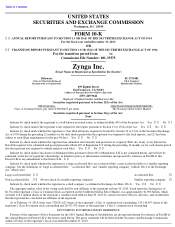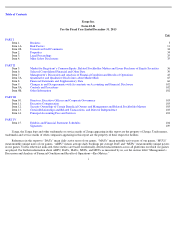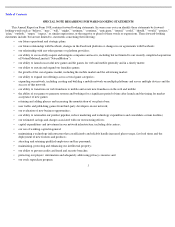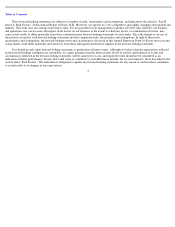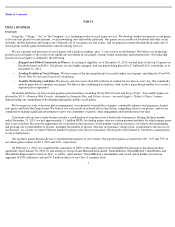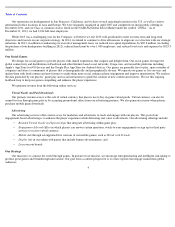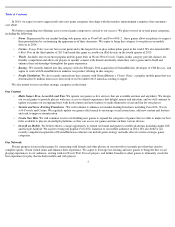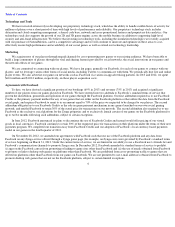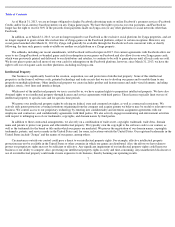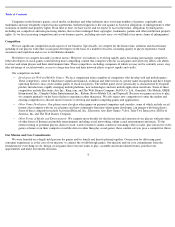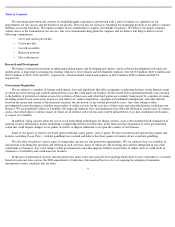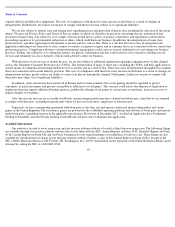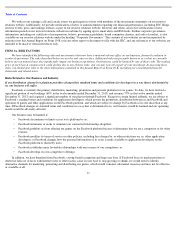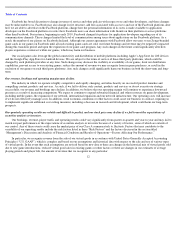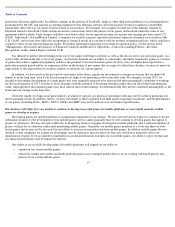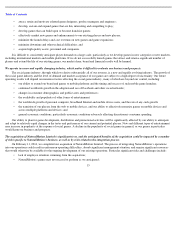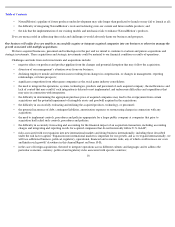Zynga 2013 Annual Report Download - page 10
Download and view the complete annual report
Please find page 10 of the 2013 Zynga annual report below. You can navigate through the pages in the report by either clicking on the pages listed below, or by using the keyword search tool below to find specific information within the annual report.
Table of Contents
Technology and Tools
We have invested extensively in developing our proprietary technology stack, which has the ability to handle sudden bursts of activity for
millions of players over a short period of time with high levels of performance and reliability. Our proprietary technology stack includes
datacenter and cloud computing management, a shared code base, network and cross-promotional features and proprietary data analytics. Our
technology stack also supports the growth of our 2D and 3D game engines across the mobile business in addition to supporting high-level
security and anti-fraud infrastructure. We believe that investing in technology tools, including the simulation technologies we recently acquired
with our purchase of NaturalMotion, can be a competitive advantage and we will continue to innovate and optimize in these areas to cost-
effectively ensure high performance and availability of our social games as well as extend our technology leadership.
Marketing
We acquire most of our players through unpaid channels by cross-promoting new games to our existing audience. We have been able to
build a large community of players through the viral and sharing features provided by social networks, the social innovations in our games and
the network effects of our games.
We are committed to connecting with our players. We have fan pages, generally on Facebook, for each of our games to connect with our
players; and we leverage various other forms of social media, including Twitter, to communicate with them. We periodically host live and online
player events. We also advertise our games on networks such as Facebook via various in-app advertising partners. In 2013 and 2012, we spent
$60.6 million and $102.2 million, respectively, on these player acquisition costs.
Agreements with Facebook
To date, we have derived a significant portion of our bookings (69% in 2013) and revenue (75% in 2013) and acquired a significant
number of our players from our games played on Facebook. We have entered into two addenda to Facebook’s standard terms of service that
govern the distribution, promotion and operation of our games through the Facebook platform. Our first addendum required us to use Facebook
Credits as the primary payment method for any of our games that are either on the Facebook platform or that utilize the data from the Facebook
social graph, and requires Facebook to remit to us an amount equal to 70% of the price we requested to be charged to our players. The second
addendum obligated us to use Facebook Credits as the sole in-game payment mechanism in any games launched on our own social gaming
network, and entitled Facebook to retain 30% of the stated price for transactions on our network. The second addendum also required us to use
Facebook as the exclusive social platform for the Zynga properties and to exclusively launch certain of our games on the Facebook platform for
up to twelve months following such addendum, subject to certain exceptions.
In June 2012, Facebook announced its plans to discontinue the use of Facebook Credits and instead would offer pricing of our virtual
goods in local currencies. Facebook continues to retain 30% of the requested price for transactions on their platform under the terms of their new
payments program. We completed our transition away from Facebook Credits and our adoption of Facebook’s local currency-based payments
model in our games in the fourth quarter of 2013.
On November 28, 2012, we amended our agreements with Facebook such that our use of the Facebook platform and any data from
Facebook on any Zynga service offered through a Zynga game page (for example, on Zynga.com) were governed by Facebook’s standard terms
of service beginning on March 31, 2013. Under the current terms of service, we are limited in our ability to use a Facebook user’
s friends list and
Facebook’s communication channels to promote Zynga.com. In December 2012, Facebook amended its standard terms of service to prohibit
(i) apps on the Facebook canvas from promoting or linking to game sites other than Facebook and (ii) the use of emails obtained from Facebook
to promote or link to desktop web games on platforms other than Facebook. We are prohibited from cross-promoting traffic to games that are
offered on platforms other than Facebook from our games on Facebook. We are not permitted to use e-
mail addresses obtained from Facebook to
promote desktop web games that are not on the Facebook platform, subject to certain limited exceptions.
6


